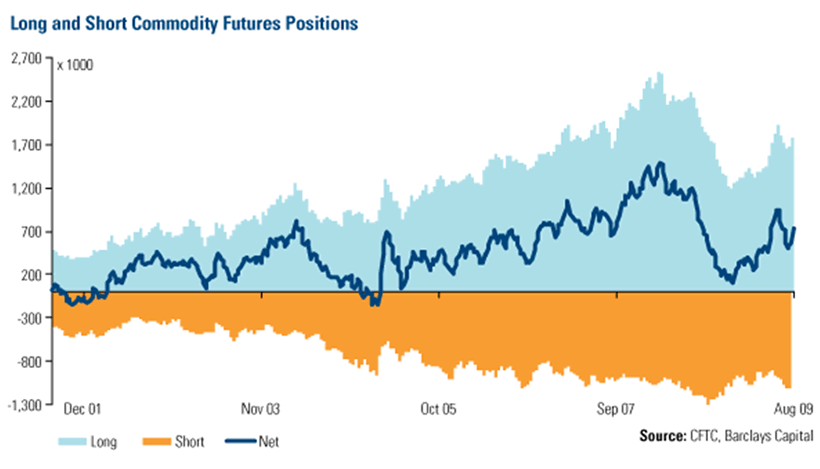Speculators Aren’t Wicked, They Keep Commodity Markets Liquid
Commodities / Commodities Trading Aug 17, 2009 - 12:47 PM GMTBy: Frank_Holmes
 This commentary is from our natural resources team
This commentary is from our natural resources team
The Commodities Futures Trading Commission (CFTC) wrapped up its hearings on whether to install position limits on futures trading this week, and like other hot topics being tossed around Capitol Hill, misinformation seems to be running rampant.
One myth is that speculators only bet on prices going higher. The chart below shows both long and short futures positions for all commodities. While it’s definitely not a one-to-one ratio, the chart shows that investing in futures is a two-way street, with investors lining up on both sides.

Another myth is the overall size of the speculative market. According to a recent TIME article, less than three percent of the world’s oil consumption over the next year is under futures contract.
Several U.S. lawmakers have claimed that speculative investors in London are using lax laws to control oil prices. However, data published by the CFTC and the Financial Times disproves that theory.
As of last week, more than 18 percent of oil speculators were trading in New York while only 9.6 percent resided in London. The FT points out that “spread” positions popular with hedge funds are also skewed towards the Big Apple.
Even the “speculator” label sounds sinister when all that is happening is that a bet is being made that a certain investment will either rise or fall in the future. That sounds pretty similar to any other type of investment.
Speculators are important because they provide liquidity for commodity producers, while allowing them to hedge their price risk. Imposing caps on the sizes of these futures positions could significantly limit their ability to hedge commodity risk.
Jeffrey Sprecher, CEO and Chairman of the Intercontinental Exchange, said in his testimony this week that “setting hard position limits across all months could drain market liquidity, impede price discovery and drive market participants off of exchanges.”
Without this liquidity, producers would find it difficult to hedge against commodity price risk, and projects that require more up-front capital, like Canadian oil sands, would be threatened. This would ultimately lead to lower production and higher long-term prices.
This issue is a good example of keeping long-term goals in mind. Imposing position caps on futures positions will only produce minimal short-term benefits while much larger unintended consequences could follow.
By Frank Holmes, CEO , U.S. Global Investors
Frank Holmes is CEO and chief investment officer at U.S. Global Investors , a Texas-based investment adviser that specializes in natural resources, emerging markets and global infrastructure. The company's 13 mutual funds include the Global Resources Fund (PSPFX) , Gold and Precious Metals Fund (USERX) and Global MegaTrends Fund (MEGAX) .
More timely commentary from Frank Holmes is available in his investment blog, “Frank Talk”: www.usfunds.com/franktalk .
Please consider carefully the fund's investment objectives, risks, charges and expenses. For this and other important information, obtain a fund prospectus by visiting www.usfunds.com or by calling 1-800-US-FUNDS (1-800-873-8637). Read it carefully before investing. Distributed by U.S. Global Brokerage, Inc.
All opinions expressed and data provided are subject to change without notice. Some of these opinions may not be appropriate to every investor. Gold funds may be susceptible to adverse economic, political or regulatory developments due to concentrating in a single theme. The price of gold is subject to substantial price fluctuations over short periods of time and may be affected by unpredicted international monetary and political policies. We suggest investing no more than 5% to 10% of your portfolio in gold or gold stocks. The following securities mentioned in the article were held by one or more of U.S. Global Investors family of funds as of 12-31-07 : streetTRACKS Gold Trust.
Frank Holmes Archive |
© 2005-2022 http://www.MarketOracle.co.uk - The Market Oracle is a FREE Daily Financial Markets Analysis & Forecasting online publication.



